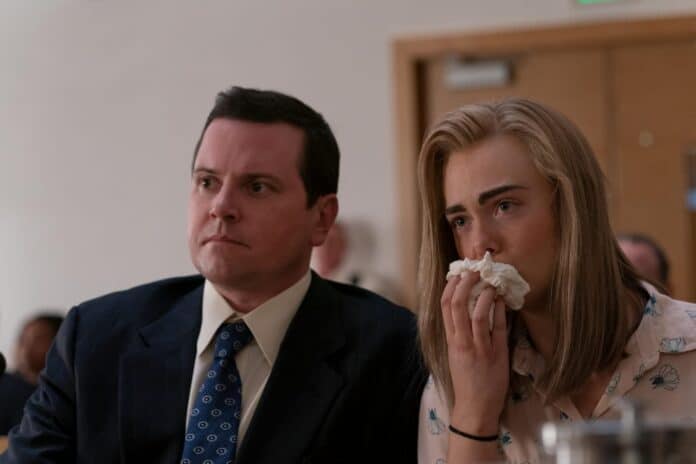What Was Dr. Breggin’s Testimony? Let’s check out. ‘The Girl from Plainville‘ dives into the circumstances behind Conrady Roy III’s death, as well as his lover Michelle Carter’s role in the tragedy. The Hulu drama follows the development of the two teenagers’ friendship, as well as Michelle’s subsequent trial after text conversations between her and Conrad are uncovered.
Michelle’s defence sends in Dr. Peter Breggin, an expert witness, to show Michelle’s innocence when she is charged with involuntary manslaughter. The doctor’s evidence, while initially persuasive, is now heavily contested. In fact, before episode 7, a disclaimer reads as much. What you need to know about Dr. Peter Breggin’s real testimony is outlined below.
Recommended: The Girl from Plainville Episode 7 Recap and Ending Explained

Dr. Breggin’s Testimony: What Was He Saying?
Michelle Carter’s trial focused on an involuntary manslaughter accusation against her, with the defence alleging that Michelle encouraged Conrad to commit suicide via text messages and phone calls. If found guilty, the 20-year-old may face a term of up to twenty years in prison.
Dr. Peter Breggin, a defence witness, has testified as an expert witness in many trials. He concentrates on the effects of selective serotonin reuptake inhibitors (SSRI) drugs such as Celexa on people’s behaviour, as witnessed on the show. Michelle had been using Prozac for years, according to Dr. Breggin, and switching to Celexa made her “intoxicated” and unable to develop a coherent goal.
The doctor told the court and Judge Lawrence Moniz that Michelle believed she was assisting Conrad in getting what he wanted due to “involuntary intoxication.” Michelle was 17 when Conrad died, and according to Dr. Breggin, the adolescent brain is “more vulnerable to injury and all intrusions.”
Dr. Breggin stated his evidence was based on reading through Michelle’s school records and text messages, as well as interviews with many persons who knew her, despite the fact that he had never treated her. Michelle had already sought to aid Conrad (during his attempted suicide in 2012), according to the psychiatric expert testimony. Celexa, on the other hand, had a negative psychological impact on her and even caused her to have disturbing nightmares.

Why there was dispute on Dr. Breggin’s Testimony?
Assistant District Attorney Katie Rayburn, who headed the prosecution in Michelle Carter’s case, raised a few points of concern with Dr. Breggin’s testimony. It should be remembered that “involuntary intoxication” is a legal phrase rather than a medical diagnostic. Dr. Breggin again changed his timeline during interrogation, including the important date of July 2, 2014, when Michelle Carter allegedly suffered from involuntary intoxication.
The prosecution also alleged that Michelle was never “transformed,” notwithstanding Dr. Breggin’s intoxication diagnosis. Instead, it was claimed that the text messages found in evidence depicted her as manipulative, coercive, and desperate for attention. Finally, it was mentioned that Dr. Breggin revised his diagnosis to anxiety and depression a few weeks before the study, after earlier describing Michelle as mentally stable.
Dr. Breggin has testified as an expert witness in over a dozen trials and is well-known for his criticism of antidepressants and other psychiatric prescription medicines. His opinions have been regarded with suspicion at times and with success at others. A judge agreed with Dr. Breggin in a 2011 case that Prozac had induced an adolescent to kill.
However, there have been instances where Dr. Breggin’s opinions have been disregarded. Michelle Carter was eventually charged with involuntary manslaughter and sentenced to 2 1/2 years in jail, 15 months of which she had already served and the remainder suspended.














